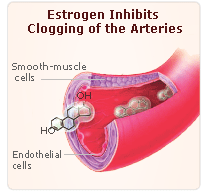A study published in The New England Journal of Medicine presents new research suggesting that estrogen is a vital key to preventing cardiovascular disease. Elevated estrogen levels may be the definitive factor in women's lower risk for heart disease as compared to men, the study says.
Estrogen seems to have this heart-healthy effect for several reasons. Estrogen hormones have a variety of essential effects on the circulatory system: estrogen hormones encourage the dilation of blood vessels, estrogen helps blood vessels in recovering from injury, and estrogen also inhibits clogging of the arteries. In fact, one report has revealed a connection between the number of estrogen receptors in coronary arteries and the likelihood for obstruction of the arteries in premenopausal women, in that women with fewer estrogen receptors are more likely to experience clogging of the arteries.
Estrogen seems to have this heart-healthy effect for several reasons. Estrogen hormones have a variety of essential effects on the circulatory system: estrogen hormones encourage the dilation of blood vessels, estrogen helps blood vessels in recovering from injury, and estrogen also inhibits clogging of the arteries. In fact, one report has revealed a connection between the number of estrogen receptors in coronary arteries and the likelihood for obstruction of the arteries in premenopausal women, in that women with fewer estrogen receptors are more likely to experience clogging of the arteries.

Estrogen has also been shown to have an effect on blood coagulation and blood clotting, antioxidants (compounds which prevent the harmful activity of free radicals in cells), and the activity of certain molecules that influence the dilation/constriction of blood vessels, which are all vital factors in heart disease. Estrogen also has a notable effect on cholesterol levels: several studies have demonstrated that estrogen acts to lower total blood cholesterol levels, and especially levels of unsafe, artery-clogging LDL cholesterol and triglyceride fats, while augmenting levels of the healthy, artery-protecting HDL cholesterol. Estrogen has also been shown to boost the dilation of arteries in postmenopausal women during exercise, facilitating better circulation.
Furthermore, seems to promote the growth of the cells that line the blood vessels (medicinally known as “endothelial” cells), which may help to protect against and heal from injury. Estrogen also has been shown to diminish enlarged and/or broken blood vessels.
In women, fluctuating estrogen levels will also lead to a fluctuating risk for cardiovascular disease. Premenopausal women have the lowest risk, while postmenopausal women (whose estrogen levels are five to twenty times lower than during premenopause, and can decline to levels even lower than in men) have a higher risk for heart disease. Improving postmenopausal estrogen levels can help to reduce that risk.